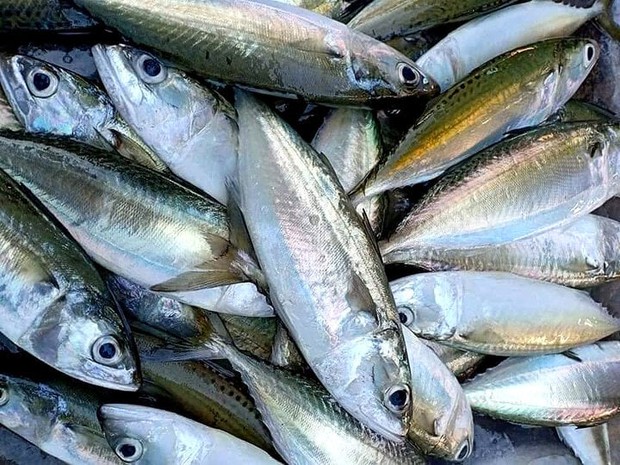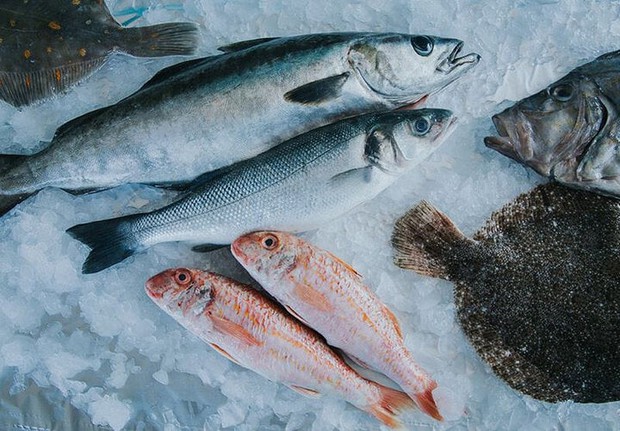If you live in inland areas, you do not have the opportunity to enjoy freshly caught fish. Fish transported from the sea always have different levels of freshness and are not equally likely to be contaminated with chemicals. Knowing how to choose fresh, non-toxic marine fish is something that everyone needs to know to ensure food safety for their families.
How to choose fresh marine fish
A fresh marine fish must first have a shiny body with firm flesh. The mouth of a fresh fish is usually closed. Meanwhile, a stale fish has no elasticity and its mouth is slightly open.
The eyes of a fresh fish are bright, slightly protruding, and tense. The gills of fresh marine fish must be pink or bright red. Conversely, a stale fish has cloudy, sunken eyes, and feels slimy or dry to the touch.

Do you know how to choose fresh marine fish that are free of toxic substances? (Photo: M.B)
Fresh marine fish have white, deeply recessed anuses and flat stomachs; while stale fish have pink or purple anuses that protrude; and distended bellies.
The scales of fresh marine fish are shiny, and when viewed in the sun will appear iridescent, clinging tightly to the body of the fish, without mucus or odor. In contrast, the scales of stale marine fish are dull, do not adhere to the body of the fish, and smell very fishy.
Fishy is the characteristic smell of fish, but if the fish is fresh, you will notice the characteristic flavor of seawater, while stale fish smell very unpleasant.
How to choose chemical-free marine fish
In order to save costs and maximize profits, many retailers import a lot of marine fish to sell and often marinate them with urea to keep them fresh for longer. Urea-marinated fish look fresh to the naked eye, with clear eyes and bright red gills, but they lack elasticity and when you press your finger into the fish’s body, it will leave an indentation.
Urea-marinated fish have a urine-like smell, which is different from the characteristic fishy smell of marine fish. When washed, the fish will be soft, and when fried or stewed, it will be easy to fall apart, the meat will be bland and not fragrant.
Therefore, to choose fresh, non-toxic marine fish, you should choose reputable seafood stores with clear origins.

How to choose fresh marine fish: The mouth of a fresh fish is usually closed, free of toxic substances? (Photo: Greendale)
Some types of marine fish are very good for health
Marine fish are rich in nutrients, especially omega 3 fatty acids, protein, and essential vitamins. In particular, the following types of fish are very good for the body:
Salmon: Contains a lot of protein, vitamins D, B6, B12, selenium, phosphorus, potassium… Each serving of salmon contains more than 1,500mg of omega 3. Mackerel: Rich in unsaturated and polyunsaturated fatty acids, which helps reduce the risk of cardiovascular problems. Mackerel also contains anti-inflammatory compounds that help reduce joint pain and stiffness. Sardines: Contain nearly 1,200mg of omega 3 fat in one serving. In addition, sardines are rich in vitamin D and calcium, which are essential for bones and muscles.
Tuna: Is a type of fish that is very rich in protein, DHA as well as vitamins A, B, B16, B12…, which help improve memory.
Cod: Is a type of white fish, rich in protein and fat, rich in vitamins A, C, calcium and essential minerals for the body…
4 Types of Fish Containing High Levels of Heavy Metals: Avoid Buying Fish Before Tet
 Fish Before Tet’>
Fish Before Tet’>In addition to chicken, duck, goose, and fish are delicious foods that many families buy to prepare before Tet.
































